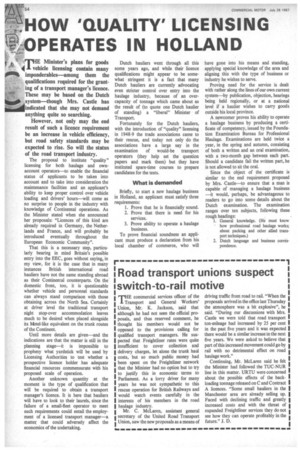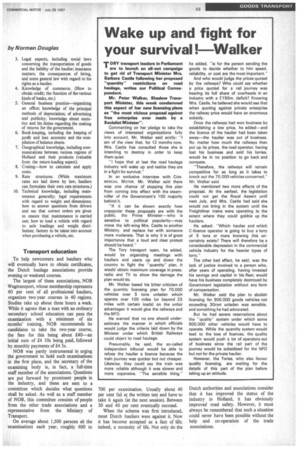HOW 'QUALITY' LICENSING OPERATES IN HOLLAND
Page 56

Page 57

If you've noticed an error in this article please click here to report it so we can fix it.
by Norman Douglas
Minister's plans for goods vehicle licensing contain many imponderables—among them the qualifications required for the granting of a transport manager's licence. These may be based on the Dutch system—though Mrs. Castle has indicated that she may not demand anything quite so searching.
However, not only may the end result of such a licence requirement be an increase in vehicle efficiency, but road safety standards may be expected to rise. So will the status of the road transport industry.
The proposal to institute "quality" licensing for both haulage and ownaccount operators--to enable the financial status of applicants to be taken into account and to take into consideration the maintenance facilities and an applicant's ability to keep proper control over vehicle loading and drivers' hours—will come as no surprise to people in the industry with knowledge of Continental operations. As the Minister stated when she announced her proposals: "Licences of this kind are already required in Germany, the Netherlands and France, and will probably be introduced eventually throughout the European Economic Community".
That this is a necessary step, particularly bearing in mind Britain's possible entry into the EEC, goes without saying, in my view, for it is the case that in many instances British international road hauliers have not the same standing abroad as their Continental counterparts. On the • domestic front, too, it is questionable whether vehicle and personnel standards can always stand comparison with those obtaining across the North Sea. Certainly at driver level the traditional transport night stop-over accommodation leaves much to be desired when placed alongside its Motel-like equivalent on the trunk routes of the Continent.
Until more details are given—and the indications are that the matter is still in the planning stage--it is impossible to prophesy what yardstick will be used by Licensing Authorities to test whether a prospective licence holder has adequate financial resources commensurate with his proposed scale of operation.
Another unknown quantity at the moment is the type of qualification that will be required to obtain a transport manager's licence. It is here that hauliers will have to look to their laurels, since the failure of a small-fleet operator to meet such requirements could entail the employment of a licensed transport manager—a matter that could adversely affect the economics of the undertaking. Dutch hauliers went through all this some years ago, and while their licence qualifications might appear to be somewhat stringent it is a fact that many Dutch hauliers are currently advocating even stricter control over entry into the haulage industry, because of an overcapacity of tonnage which came about as the result of (to quote one Dutch haulier of standing) a "liberal" Minister of Transport.
Fortunately for the Dutch hauliers, with the introduction of "quality" licensing in 1948-9 the trade associations came to their rescue, and today not only do the associations have a large say in the examination of would-be transport operators (they help set the question papers and mark them) but they have instituted spare-time courses to prepare candidates for the tests.
What is demanded
Briefly, to start a new haulage business in Holland, an applicant must satisfy three requirements: 1. Prove that he is financially sound.
2. Prove that there is need for his services.
3. Prove ability to operate a haulage business.
To prove financial soundness an applicant must produce a declaration from his local chamber of commerce, who will have gone into his means and standing, applying special knowledge of the area and aligning this with the type of business or industry he wishes to serve.
Proving need for the service is dealt with rather along the lines of our own current system by publication, objection, hearings being held regionally, or at a national level if a haulier wishes to carry goods outside his local province.
A newcomer proves his ability to operate a haulage business by producing a certificate of competency, issued by the Foundation Examination Bureau for Professional Haulage. Examinations are held twice a year, in the spring and autumn, consisting of both a written and an oral examination, with a two-month gap between each part. Should a candidate fail the written part, he is not allowed to sit the oral.
Since the object of the certificate is similar to the end requirement proposed by Mrs. Castle—to ensure that a man is capable of managing a haulage business —it would, perhaps, be advantageous to readers to go into some details about the Dutch examination. The examination ranges over ten subjects, following these rough headings:
1. General knowledge. (He must know • how professional road haulage works; about packing and other allied transport techniques.) 2. Dutch language and business correspondence. 3. Legal aspects, including social laws concerning the transportation of goods and the liability of the haulier; insurance matters; the consequences of hiring, and some general law with regard to his rights as a haulier.
4. Knowledge of commerce. (How to obtain credit; the function of the various kinds of banks, etc.) 5General business practice—organizing an office: knowledge of the principal methods of depreciation; of advertising and publicity; knowledge about statistics and his duties regarding the making of returns for the government.
6. Book-keeping, including the keeping of profit and loss accounts and the compilation of balance sheets.
7. Geographical knowledge, including communications between various regions of Holland and their products (valuable from the return-loading aspect).
8. Costing—how to calculate and apply costs.
9. Rate structures. (While maximum rates are laid down by law, hauliers can formulate their own rate structures.) 10. Technical knowledge, including maintenance generally; legal requirements with regard to weight and dimensions; how to answer questions from drivers and see that correct orders are given to ensure that maintenance is carried out; how to load a vehicle with regard to axle loadings and weight distribution; factors to be taken into account when purchasing a vehicle, etc.
Transport education To help newcomers and hauliers who will eventually have to obtain certificates, the Dutch haulage associations provide evening or weekend courses.
The largest of these associations, NOB Wegtransport, whose membership represents 60 per cent of all professional hauliers, organizes two-year courses in 40 regions. Studies take up about three hours a week. While it agrees that a man with an ordinary secondary school education can pass the examination with a minimum of six months' training, NOB recommends its candidates to take the two-year course, the fees for this being about £40—an initial sum of £4 lOs being paid, followed by monthly payments of £4 5s.
NOB was partly instrumental in urging the government to hold such examinations in the first place, and the secretary of the examining body is, in fact, a full-time staff member of the associations. Questions are put forward by prominent people in the industry, and these are sent to a committee which decides what questions shall be asked. As well as a staff member of NOB, this committee consists of people from the other trade associations and a representative from the Ministry of Transport.
On average about 1,500 persons sit the examinations each year, roughly 600 to
700 per examination. Usually about 40 per cent fail at the written test and have to take it again (at the next session). Between 30 and 40 per cent eventually succeed.
When the scheme was first introduced, most Dutch hauliers were against it. Now it has become accepted as a fact of life; indeed, a necessity of life. Not only do the Dutch authorities and associations consider that it has improved the status of the industry in Holland, it has obviously improved road safety. However, it must always be remembered that such a situation could never have been possible without the help and co-operation of the trade associations.




































































































































































